A short interview with Phillip Lopate
 In June 2018 I interviewed Philip Lopate, who is probably the most famous living essayist in the world. On camera.* It was something I’d never done before, and to say I was nervous is an understatement. I shook hands with him the day before and heard him deliver his keynote for the ‘Taking ideas for a walk’ Essay conference. At the interview, Lopate’s ever-present expression of mild amusement helped me relax. I was no stranger to his work having read an early collection of personal essays called Portrait of My Body, an anthology he edited – The Art of the Personal Essay, and also To Show and to Tell, the essential Lopate text for any budding essayist. Having access to so much of his thoughts and his life, I
In June 2018 I interviewed Philip Lopate, who is probably the most famous living essayist in the world. On camera.* It was something I’d never done before, and to say I was nervous is an understatement. I shook hands with him the day before and heard him deliver his keynote for the ‘Taking ideas for a walk’ Essay conference. At the interview, Lopate’s ever-present expression of mild amusement helped me relax. I was no stranger to his work having read an early collection of personal essays called Portrait of My Body, an anthology he edited – The Art of the Personal Essay, and also To Show and to Tell, the essential Lopate text for any budding essayist. Having access to so much of his thoughts and his life, I 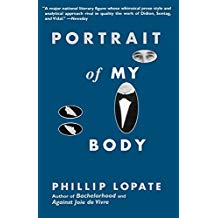 felt as if I already knew him a little. Lopate’s experience working with students helps him to diffuse the ‘cut-throat atmosphere’ of his graduate classes, he told me (and he certainly knew how to make this nervous student relax). He said that that his technique amounted to ‘basically giving them a lot of encouragement and trying to make some jokes so they can laugh.’ I suspected that this might be his default position for any setting, but he has been teaching forever. In 1975 he worked on the Teachers & Writers Collaborative’s first project as a teacher-in-school, where he worked with primary school aged children for twelve years. After that, he began teaching in higher education, teaching Creative Writing at undergraduate and post-graduate levels at prestigious institutions like the University of Houston and New York University. Lopate currently directs the graduate non-fiction program at his alma mater, Columbia University.
felt as if I already knew him a little. Lopate’s experience working with students helps him to diffuse the ‘cut-throat atmosphere’ of his graduate classes, he told me (and he certainly knew how to make this nervous student relax). He said that that his technique amounted to ‘basically giving them a lot of encouragement and trying to make some jokes so they can laugh.’ I suspected that this might be his default position for any setting, but he has been teaching forever. In 1975 he worked on the Teachers & Writers Collaborative’s first project as a teacher-in-school, where he worked with primary school aged children for twelve years. After that, he began teaching in higher education, teaching Creative Writing at undergraduate and post-graduate levels at prestigious institutions like the University of Houston and New York University. Lopate currently directs the graduate non-fiction program at his alma mater, Columbia University.
At the interview, we had both just come away from a conference panel on teaching the essay, where attendees ranged from sixth year, undergraduate and post-graduate students to lecturers, critics and professional essayists. The discussion attempted to traverse the murky waters of teaching ‘good writing’ but kept getting stuck on the big issue of formulaic essays. Needless to say, the pressure to write essays that ‘hit the marks’ is intense for students relying on good grades to take the next step in their academic 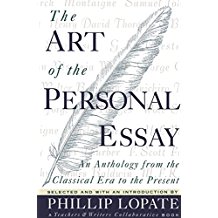 careers; in this melee, creativity can end-up taking a back seat. Lopate told me he was struck by the similarities between teaching in Scotland and teaching in the US. In American high schools and colleges, students are taught to write five-paragraph essays with topic sentences. His daughter, who is currently a student, is cursed with having a professional essayist for a father – ‘She would try to write in the way I taught her, you know, full of ambivalence and uncertainty and she would be punished. They would say to her, you can’t take both sides of the argument you have to take one.’ There’s no sitting on the fence, no space for conflict or confusion in academic writing. Of course, those crucial ‘marks’ are not something that professional essayists pay attention to, just ask Phillip Lopate – ‘the way I write, I never do topic sentences, I just start writing, and every sentence is a killer sentence.’
careers; in this melee, creativity can end-up taking a back seat. Lopate told me he was struck by the similarities between teaching in Scotland and teaching in the US. In American high schools and colleges, students are taught to write five-paragraph essays with topic sentences. His daughter, who is currently a student, is cursed with having a professional essayist for a father – ‘She would try to write in the way I taught her, you know, full of ambivalence and uncertainty and she would be punished. They would say to her, you can’t take both sides of the argument you have to take one.’ There’s no sitting on the fence, no space for conflict or confusion in academic writing. Of course, those crucial ‘marks’ are not something that professional essayists pay attention to, just ask Phillip Lopate – ‘the way I write, I never do topic sentences, I just start writing, and every sentence is a killer sentence.’
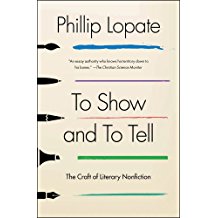 Unbridled natural talent aside, Lopate currently works for an academic institution and has to be able to guide and support students in their own writing. One of the bigger issues he faces as a teacher, he confessed, is what he calls the ‘Social Darwinish’ atmosphere of his classes: a tendency to vie for the position of the ‘anointed’. But Lopate isn’t into favouritism. In fact, he actively guards against it by diminishing his role in the classroom. He tells his students – ‘don’t just do everything I say, it’s got to feel right to you.’ He calls it ‘arming’ his students against himself. His most significant gambit though, is giving them permission to fall flat on their faces. By giving his students the space to try and to fail, he creates a space for learning and for teaching: a space that allows healthy growth without the suffocating stress of expectation. Having your work assessed by someone who has made a career out of observation and critique is both daunting and thrilling. The intensity of that environment can be wearing, especially when stuck at the centre of a tug of war between the quiet voice of your high school teacher nagging you about thesis statements and your desire to write an experimental essay incorporating cuneiform. He told me that in group work, his students would point to ‘the very thing that’s original and say – this has got to go, this is wrong – because it stands out somehow.’ Lopate was quite frank about it taking him a few tries to ‘get’ a student’s voice, to really hear what they are trying to say. That is where the space to fail comes in, he doesn’t hack up a piece with red pen, obliterating anything that doesn’t fit the Phillip Lopate school of essay writing. If he doesn’t quite grasp a student’s intent, he says ‘show me, tell me’. Try.
Unbridled natural talent aside, Lopate currently works for an academic institution and has to be able to guide and support students in their own writing. One of the bigger issues he faces as a teacher, he confessed, is what he calls the ‘Social Darwinish’ atmosphere of his classes: a tendency to vie for the position of the ‘anointed’. But Lopate isn’t into favouritism. In fact, he actively guards against it by diminishing his role in the classroom. He tells his students – ‘don’t just do everything I say, it’s got to feel right to you.’ He calls it ‘arming’ his students against himself. His most significant gambit though, is giving them permission to fall flat on their faces. By giving his students the space to try and to fail, he creates a space for learning and for teaching: a space that allows healthy growth without the suffocating stress of expectation. Having your work assessed by someone who has made a career out of observation and critique is both daunting and thrilling. The intensity of that environment can be wearing, especially when stuck at the centre of a tug of war between the quiet voice of your high school teacher nagging you about thesis statements and your desire to write an experimental essay incorporating cuneiform. He told me that in group work, his students would point to ‘the very thing that’s original and say – this has got to go, this is wrong – because it stands out somehow.’ Lopate was quite frank about it taking him a few tries to ‘get’ a student’s voice, to really hear what they are trying to say. That is where the space to fail comes in, he doesn’t hack up a piece with red pen, obliterating anything that doesn’t fit the Phillip Lopate school of essay writing. If he doesn’t quite grasp a student’s intent, he says ‘show me, tell me’. Try.
Lopate has been teaching as long as he has been writing. He wrote seriously as a poet for fifteen years before trying his hand at prose. His first foray into non-fiction essays was inspired by reading Charles Lamb and William Haslett and thinking, ‘maybe I could try this?’ His very first essay, ‘My Drawer’, has Lopate rifling through his top drawer and engaging in self-analysis inspired by the items he finds there. As he pulls out old keys, eyeglasses and some unwanted gifts he was superstitiously holding on to, he unpacks the reasons why; the serious consideration of each item and his own relation to them ‘was very emblematic of beginning essays’, he remarked. I was particularly curious about Lopate’s inspirations, how he takes his mundane experiences and decidedly ordinary thoughts and makes them interesting. What is it about a particular pet peeve or observation that warrants in-depth exploration? Being a personal essayist, much of Lopate’s writing centres on himself, but he maintains that he not so much fascinated by himself, only curious. Being curious about yourself and asking questions like, ‘why do I keep making that same mistake?’, or ‘why do I keep getting into that same dead end with people?’ he explained, is good material. Lopate’s very first essay became the first essay in his first collection; ‘I got lucky’, he said. Perhaps. But there’s something appealing about his brand of honest eloquence and quirkiness. His uncomplicated prose and conversational tone are something of a lure. He seems to wave you over for a comfortable chat that takes all afternoon, and when you part ways, you feel as if you know something of him as a person. Something real.
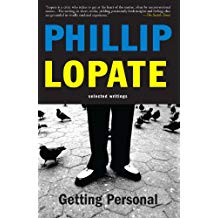 The biggest part of probing personal essays that Lopate writes, is the lesson. No one spends time picking apart the shape of their own hands or the acceptableness of their own penis, only to allow the revelations to fade to nothingness. He is engaging in a deliberate scrutiny of self. I wondered what was the biggest lesson he’d learned. Ever the teacher, he told me ‘rewriting is the biggest lesson. You get smarter by rewriting’. Of course, a writer doesn’t have to rely on their initial response. That response is an entry point, a drawer to be opened and rifled through. And you will get smarter; editing a piece of writing is a reconfiguration of your understanding on the page. Lopate observed that all of his essays talk to each other; each one is a part of a dialogue on his writing and his life, and each one carries something of the ones that came before. I asked: but isn’t there only so much material and so many times you can peer at yourself before you’re running over the same ground? His response was to challenge yourself as a writer: take on different assignments and experiment with something new, but at the same time incorporate your own strengths. Humour is a big part of his writing; ‘regardless of what I’m writing, I try to work I around to a place where I can be a little bit mischievous, or self-mocking or funny.’ While he considers his humour a personal strength, he is also drawn to other writers that aren’t too earnest or take themselves too seriously. It is something he values in good writing.
The biggest part of probing personal essays that Lopate writes, is the lesson. No one spends time picking apart the shape of their own hands or the acceptableness of their own penis, only to allow the revelations to fade to nothingness. He is engaging in a deliberate scrutiny of self. I wondered what was the biggest lesson he’d learned. Ever the teacher, he told me ‘rewriting is the biggest lesson. You get smarter by rewriting’. Of course, a writer doesn’t have to rely on their initial response. That response is an entry point, a drawer to be opened and rifled through. And you will get smarter; editing a piece of writing is a reconfiguration of your understanding on the page. Lopate observed that all of his essays talk to each other; each one is a part of a dialogue on his writing and his life, and each one carries something of the ones that came before. I asked: but isn’t there only so much material and so many times you can peer at yourself before you’re running over the same ground? His response was to challenge yourself as a writer: take on different assignments and experiment with something new, but at the same time incorporate your own strengths. Humour is a big part of his writing; ‘regardless of what I’m writing, I try to work I around to a place where I can be a little bit mischievous, or self-mocking or funny.’ While he considers his humour a personal strength, he is also drawn to other writers that aren’t too earnest or take themselves too seriously. It is something he values in good writing.
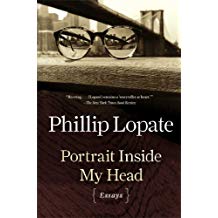 In addition to being an essay writer and curator, Lopate is also a critic. He regularly writes for the New York Review of Books, TLS and is a well-known film critic. Even while writing reviews and critiques, he approaches the problem of the assignment from a creative position. If you read a Lopate personal essay and a film review side-by-side, you’ll recognise his voice in each; he doesn’t switch between one writing style and another, and there’s always that little bit of cheekiness somewhere in the text. In our interview, he likened his approach to writing to being ‘a shoemaker, laying out the leather’, taking the shape of the question before fitting the solution together. Be it a critical piece or a keynote speech, he always tries to work out how to ‘honour what they want me to do, but hijack it for something that I want to do.’ He has been honing this technique since his undergraduate days. When he was given a paper to write, he would ‘try to figure out how to write enough to please them, but also how to be enough of an outlaw and do what [he]… wanted to do’. But he couldn’t just be an outlaw, or he would flunk; that was where ‘the mischievous or perverse stuff’ set in. His propensity for rebellion has not always well received because ‘when you write with irony some readers don’t see it, they don’t get it.’ I asked Lopate if he was ever tempted to be more mischievous in his writing but he dismissed the idea, saying ‘sometimes when I’m reading back I think, oh my gosh, did I really do that? Did I really say that? Did I really admit that?’ Personal revelations are not his only concern though, Lopate is also conscious of the changing media culture and the narrowing of the gap between creators and their audiences – ‘you can get in trouble so easily now’, he said, ‘for example, if a man writes about a woman, he can get into trouble.’ I would argue that men writing about women without care and respect is what gets them into trouble, but he is right. Discourse, particularly language that is used for and around women and ‘minority’ groups is in a state of revision and revolution, and being conscious of your own use of language is important, especially for a writer.
In addition to being an essay writer and curator, Lopate is also a critic. He regularly writes for the New York Review of Books, TLS and is a well-known film critic. Even while writing reviews and critiques, he approaches the problem of the assignment from a creative position. If you read a Lopate personal essay and a film review side-by-side, you’ll recognise his voice in each; he doesn’t switch between one writing style and another, and there’s always that little bit of cheekiness somewhere in the text. In our interview, he likened his approach to writing to being ‘a shoemaker, laying out the leather’, taking the shape of the question before fitting the solution together. Be it a critical piece or a keynote speech, he always tries to work out how to ‘honour what they want me to do, but hijack it for something that I want to do.’ He has been honing this technique since his undergraduate days. When he was given a paper to write, he would ‘try to figure out how to write enough to please them, but also how to be enough of an outlaw and do what [he]… wanted to do’. But he couldn’t just be an outlaw, or he would flunk; that was where ‘the mischievous or perverse stuff’ set in. His propensity for rebellion has not always well received because ‘when you write with irony some readers don’t see it, they don’t get it.’ I asked Lopate if he was ever tempted to be more mischievous in his writing but he dismissed the idea, saying ‘sometimes when I’m reading back I think, oh my gosh, did I really do that? Did I really say that? Did I really admit that?’ Personal revelations are not his only concern though, Lopate is also conscious of the changing media culture and the narrowing of the gap between creators and their audiences – ‘you can get in trouble so easily now’, he said, ‘for example, if a man writes about a woman, he can get into trouble.’ I would argue that men writing about women without care and respect is what gets them into trouble, but he is right. Discourse, particularly language that is used for and around women and ‘minority’ groups is in a state of revision and revolution, and being conscious of your own use of language is important, especially for a writer.
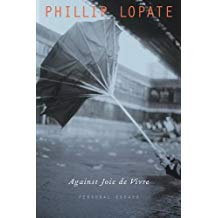 Throughout the interview I was conscious of the fact that I’d been keeping a septuagenarian from his lunch, a last meal before he set off to explore Scotland with his wife. I deliberately kept the interview short and selfishly focussed on my own burning questions. After a short fifteen minutes I decided to let him go but had one last question – how does he begin his essays, what are his starting points? As someone fascinated by writers and writing, curiosity about origins and inspirations fascinate me; Lopate countered, ‘in a way, how you enter into it is not that important, it’s what you learn from it. What I learned from reading Charles Lamb is that he would start on almost anything, and just go somewhere else.’ A suitably obscure response for a broad question, but speaking of learning prompted me to ask whether he has ever had any students that stood out immediately as talented essayists, and in true Phillip Lopate fashion, he replied mischievously – ‘There are people who are meant to be essayists and as a teacher you recognise them, you think this person has a quirky mind and is not ambitious to make a lot of money, maybe they’re really meant to be an essayist.
Throughout the interview I was conscious of the fact that I’d been keeping a septuagenarian from his lunch, a last meal before he set off to explore Scotland with his wife. I deliberately kept the interview short and selfishly focussed on my own burning questions. After a short fifteen minutes I decided to let him go but had one last question – how does he begin his essays, what are his starting points? As someone fascinated by writers and writing, curiosity about origins and inspirations fascinate me; Lopate countered, ‘in a way, how you enter into it is not that important, it’s what you learn from it. What I learned from reading Charles Lamb is that he would start on almost anything, and just go somewhere else.’ A suitably obscure response for a broad question, but speaking of learning prompted me to ask whether he has ever had any students that stood out immediately as talented essayists, and in true Phillip Lopate fashion, he replied mischievously – ‘There are people who are meant to be essayists and as a teacher you recognise them, you think this person has a quirky mind and is not ambitious to make a lot of money, maybe they’re really meant to be an essayist.
*Ed – for that filmed interview, click HERE.

Great piece Paula. I really enjoyed reading that. Envious that you got to interview Lopate!